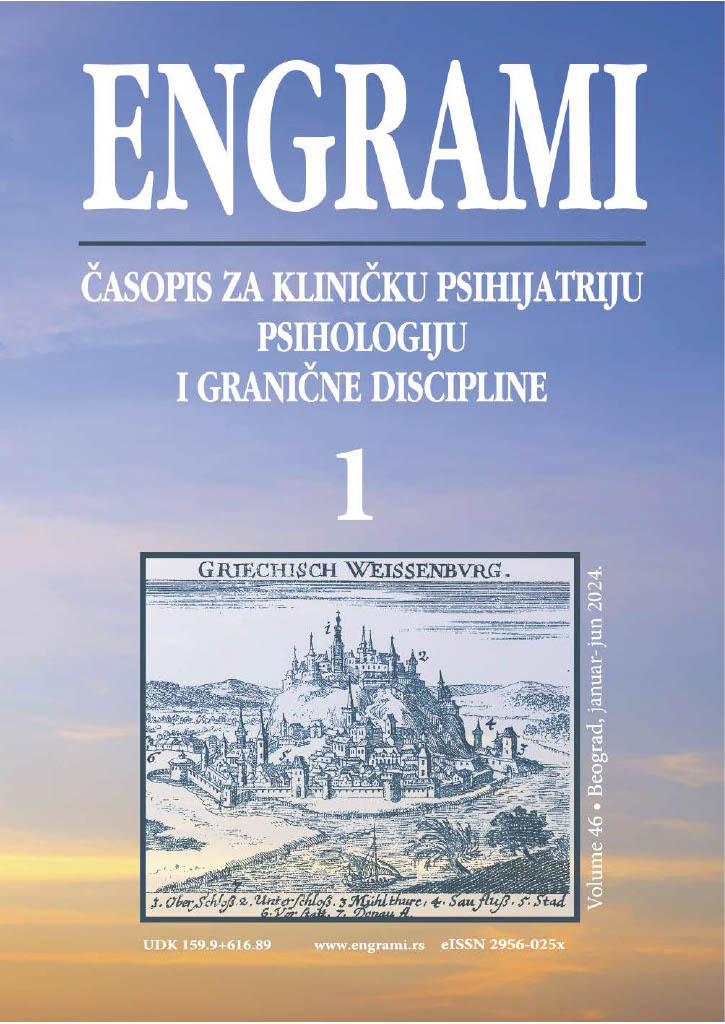Virtual reality and assessment of neurocognitive functions
Abstract
Virtual reality and assessment of neurocognitive functions
The expansion of technology over the past twenty years has led to the digitalization of psychological assessment tools and the development of new evaluation techniques, with virtual reality (VR) standing out in terms of clinical utility. VR involves temporarily suspending contact with reality and placing a person in a simulated, experimentally controlled situation that resembles a real environment. Immersion in digital reality can be either complete or partial, a dimension that depends on the technological characteristics of the virtual system and affects psychological processes and the participant's experience during the assessment process. Instead of traditional paper-and-pencil tests, the virtual environment represents a completely new medium and experimental situation that we have not previously encountered, generating a wealth of ideas in psychology. Research often investigates the ecological validity or convergent validity between psychological tests and situations created in VR, particularly with groups of individuals with dementia and schizophrenia. Executive functions are typically the focus of measurement, and there is particular interest in the potential of VR-based assessment to enable early detection of cognitive impairments in healthy individuals. The paper discusses the advantages of VR over traditional neuropsychological tests, as well as its drawbacks, particularly the phenomenon of virtual reality sickness, which limits the duration of testing and reduces the validity of measurements. It is already evident that VR techniques will be implemented into psychological test batteries to increase the sensitivity and ecological validity of neuropsychological assessments, and recommendations will be provided on how VR can be clinically utilized in the rehabilitation and therapy of cognitive functions.
Key words: virtual reality, neurocognitive functions, neuropsychological assessment
References
Đurić-Jočić D, Pavlović V, Prica I. Upotreba telepsihoterapije u radu psihologa u Srbiji. U: ALOPS 23 Vulnerabilnosti savremenog doba:pojedinac i porodica: zbornik radova. Beograd: Akademija za humani razvoj. 2024;81-93.
Đurić-Jočić D. Psihološka procena i pisanje nalaza. Beograd. Sinapsa edicije; 2023.
Parsons TD. Virtual Reality for Enhanced Ecological Validity and Experimental Control in the Clinical, Affective and Social Neurosciences. Front Hum Neurosci. 2015;9:660. doi: 10.3389/fnhum.2015.00660. PMID: 26696869.
Kim E, Han J, Choi H, Prié Y, Vigier T, Bulteau S, Kwon GH. Examining the Academic Trends in Neuropsychological Tests for Executive Functions Using Virtual Reality: Systematic Literature Review. JMIR Serious Games. 2021;9(4):e30249. doi: 10.2196/30249. PMID: 34822341.
Riva G. Virtual Reality in Clinical Psychology. Comprehensive Clinical Psychology. 2022;91–105. doi: 10.1016/B978-0-12-818697-8.00006-6. PMCID: PMC7500920.
Waltemate T, Gall D, Roth D, Botsch M, Latoschik ME. The Impact of Avatar Personalization and Immersion on Virtual Body Ownership, Presence, and Emotional Response. IEEE Trans Vis Comput Graph. 2018;24(4):1643-1652. doi: 10.1109/TVCG.2018.2794629. PMID: 29543180.
Borgnis F, Baglio F, Pedroli E, Rossetto F, Uccellatore L, Oliveira JAG, Riva G, Cipresso P. Available Virtual Reality-Based Tools for Executive Functions: A Systematic Review. Front Psychol. 2022;13:833136. doi: 10.3389/fpsyg.2022.833136.
Neguț A, Matu SA, Sava FA, David D. Virtual reality measures in neuropsychological assessment: a meta-analytic review. Clin Neuropsychol. 2016;30(2):165-84. doi: 10.1080/13854046.2016.1144793. PMID: 26923937.
Kirkham R, Kooijman L, Albertella L, Myles D, Yücel M, Rotaru K. Immersive Virtual Reality-Based Methods for Assessing Executive Functioning: Systematic Review. JMIR Serious Games. 2024;12:e50282. doi: 10.2196/50282. PMID: 38407958.
Van der Elst W, Van Boxtel MP, Van Breukelen GJ, Jolles J. A large-scale cross-sectional and longitudinal study into the ecological validity of neuropsychological test measures in neurologically intact people. Arch Clin Neuropsychol. 2008;23(7-8):787-800. doi:10.1016/j.acn.2008.09.002. PMID: 18930628.
Kourtesis P, Collina S, Doumas LAA, MacPherson SE. Validation of the Virtual Reality Neuroscience Questionnaire: Maximum Duration of Immersive Virtual Reality Sessions Without the Presence of Pertinent Adverse Symptomatology. Front Hum Neurosci. 2019;13:417. doi: 10.3389/fnhum.2019.00417. PMID: 31849627.
Borghetti D, Zanobini C, Natola I, Ottino S, Parenti A, Brugada-Ramentol V, Jalali H and Bozorgzadeh A. Evaluating cognitive performance using virtual reality gamified exercises. Front. Virtual Real. 2023; 4:1153145. doi:10.3389/frvir.2023.1153145
Kourtesis P, Papadopoulou A, Roussos P. Cybersickness in Virtual Reality: The Role of Individual Differences, Its Effects on Cognitive Functions and Motor Skills, and Intensity Differences during and after Immersion. Virtual worlds. 2024; 3(1):62-93. https://doi.org/10.3390/virtualworlds3010004
Yuan L, Kong F, Luo Y, Zeng S, Lan J, You X. Gender Differences in Large-Scale and Small-Scale Spatial Ability: A Systematic Review Based on Behavioral and Neuroimaging Research. Front Behav Neurosci. 2019; 18;13:128. doi: 10.3389/fnbeh.2019.00128. PMID: 31275121.
Kourtesis P, Collina S, Doumas LAA, MacPherson SE. Validation of the Virtual Reality Everyday Assessment Lab (VR-EAL): An Immersive Virtual Reality Neuropsychological Battery with Enhanced Ecological Validity. J Int Neuropsychol Soc. 2021;27(2):181-196. doi: 10.1017/S1355617720000764. PMID: 32772948.
Miskowiak KW, Jespersen AE, Kessing LV, Aggestrup AS, Glenthøj LB, Nordentoft M, Ott CV, Lumbye A. Cognition Assessment in Virtual Reality: Validity and feasibility of a novel virtual reality test for real-life cognitive functions in mood disorders and psychosis spectrum disorders. J Psychiatr Res. 2021;145:182-189. doi: 10.1016/j.jpsychires.2021.12.002. PMID: 34923359.
Lim JE, Wong WT, Teh TA, Lim SH, Allen JC Jr, Quah JHM, Malhotra R, Tan NC. A Fully-Immersive and Automated Virtual Reality System to Assess the Six Domains of Cognition: Protocol for a Feasibility Study. Front Aging Neurosci. 2021;12:604670. doi: 10.3389/fnagi.2020.604670. PMID: 33488382.
Mannan FA, Porffy LA, Joyce DW, Shergill SS, Celiktutan O. Automatic Detection of Cognitive Impairment with Virtual Reality. Sensors (Basel). 2023;23(2):1026. doi: 10.3390/s23021026. PMID: 36679823.
Copyright (c) 2024 Engrami

This work is licensed under a Creative Commons Attribution-ShareAlike 4.0 International License.

